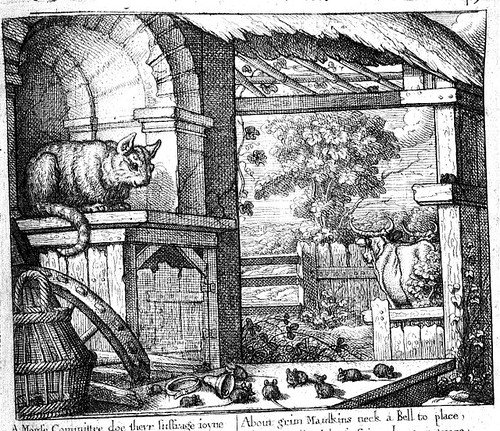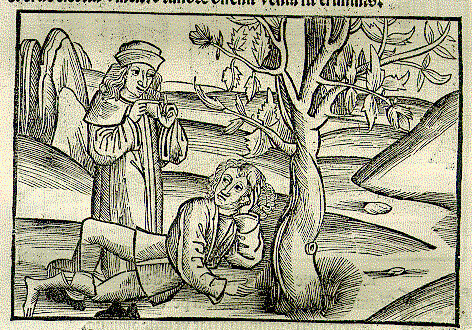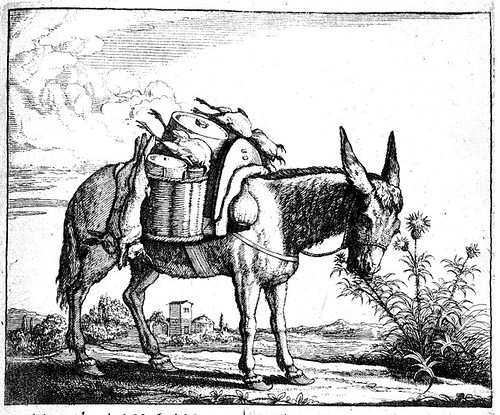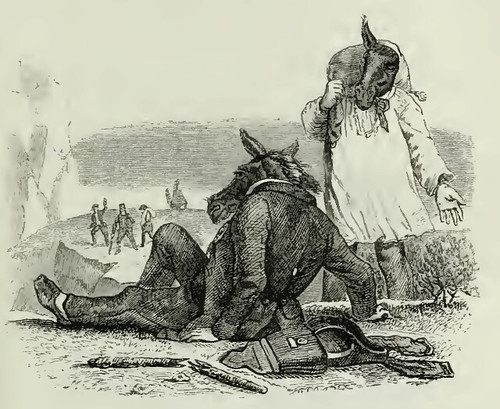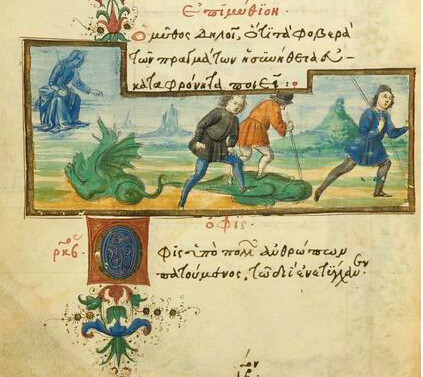HODIE: pridie Kalendas Decembres.
OWEN'S EPIGRAMS: The two new Owen epigrams, with Harvey's English versions, are Fiscus, Ut visco capiuntur aves (fiscus quasi viscus / Dicitur), a fisco sic capiuntur opes; and Filum Ariadnes, Rexit ut errantis Thesei vestigia filum / Virginis, humanum sic genus una fides. (They each come a vocabulary list!)
CAMERARIUS'S EMBLEMS: The two new emblems are De Parvis, Grandis Acervus, Spica fuit primo, quem nunc est cernere fascem: / A parvis facimus munera ad ampla gradum; and Venus Improba, Sic pereat quisquis meretrici turpiter haeret, / Per Venerem ut nimiam vipera morsa perit. (These have vocabulary too!)
SCALA SAPIENTIAE: Today you can find sayings that go up to Diederich frequency ranking 186 - so the proverbs contain nothing but words found among the 186 most commonly used words in Latin. Here is one of the items in today's list: Non nova, sed nove, "Not new things, but in a new way" (that is the motto of digitizing the ancient texts: not new texts, but done in a new way!).
VERBUM WIDGET: The word from the daily widget is ETIAM - which also has a brief essay at the Verbosum blog. Here's one of the sayings you can find in that essay: Etiam seni est discendum, "Even an old person should keep on learning" (definitely a motto I take to heart!).
GOOGLE BOOKS: Today's Google Books are Scutteputaeus' Senecae Sententiae and Merrill's Latin Hymns.
TODAY'S FABLES & STORIES:
ANECDOTE OF THE DAY: Today's anecdote is Dionysius et Iuvenes Duo, a great story about the tyrant Dionysius and how he assessed his enemies.
FABULAE FACILES: The NEW easy-to-read fable is Membra et Venter, a story about your body - and any metaphorical body, such as the "body politic" (the fable comes with a vocabulary list).
FABULAE FACILES WIDGET: The fable from the Fabulae Faciles widget is Corvus et Mercurius, a great little story about an ungrateful crow (this one also has a vocabulary list).
MILLE FABULAE: The "chunk" of Mille Fabulae et Una today is Fable 101 through Fable 110, including Lupi Bonum Facientes, a hilarious story about two wolves who learn that no good deed goes unpunished... especially if you are a wolf.
NEW MILLE FABULAE: The NEW fables with images are Venditor et Creditor Eius, the story of an Athenian who was desperate to raise some money, and Colonus Expertus et Vir Imperitus, a story about the danger of mindlessly imitating someone whose knowledge far exceeds your own.
MILLE FABULAE WIDGET: The fable from the Mille Fabulae et Una widget is Canes et Agricola Penuria, a story about some dogs in a shrinking economy.
AESOP IN ENGLISH VERSE: Today's fable from the English verse widget is Socrates and his Friends, which explains why Socrates needed only a tiny house - no McMansion for the wise philosopher!
TODAY'S MOTTOES & PROVERBS:
3-Word Mottoes: Today's 3-word motto is Flecti, non frangi (English: To bend, not to break).
3-Word Proverbs: Today's 3-word proverb is Alia aliis placent (English: Some things please some people, other things please others).
Rhyming Proverbs: Today's proverb with rhyme is: Debilis ac fortis veniunt ad limina mortis (English: Tbe weak man and the strong both come to the threshold of death).
Vulgate Verse: Today's verse is Melius est vocare ad holera cum caritate quam ad vitulum saginatum cum odio (15:17). For a translation, check out the polyglot Bible, in English, Hebrew, Latin and Greek, at the Sacred Texts Archive online.
Elizabethan Proverb Commentary: Here is today's proverb commentary, this time by Taverner: Cibum in matellam ne immittas: Put not meat into a pispot. Plutarche expoudeth this saying thus. Cast not good sentences into the minde of a wicked person. So that it is all one in effecte with that sayeng of Christ. Cast not perles afore swine. For speeche is the meat of the minde. But this meate is corrupted and doth putrifie, if it fal into an unsounde minde.
For an image today, here is Theseus and Ariadne, to go with Owen's epigram (source):
Filum Ariadnes
Rexit ut errantis Thesei vestigia filum
Virginis, humanum sic genus una fides.
Rexit ut errantis Thesei vestigia filum
Virginis, humanum sic genus una fides.






